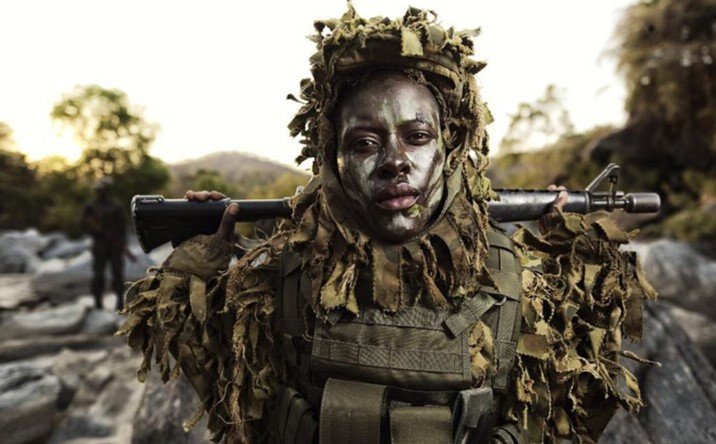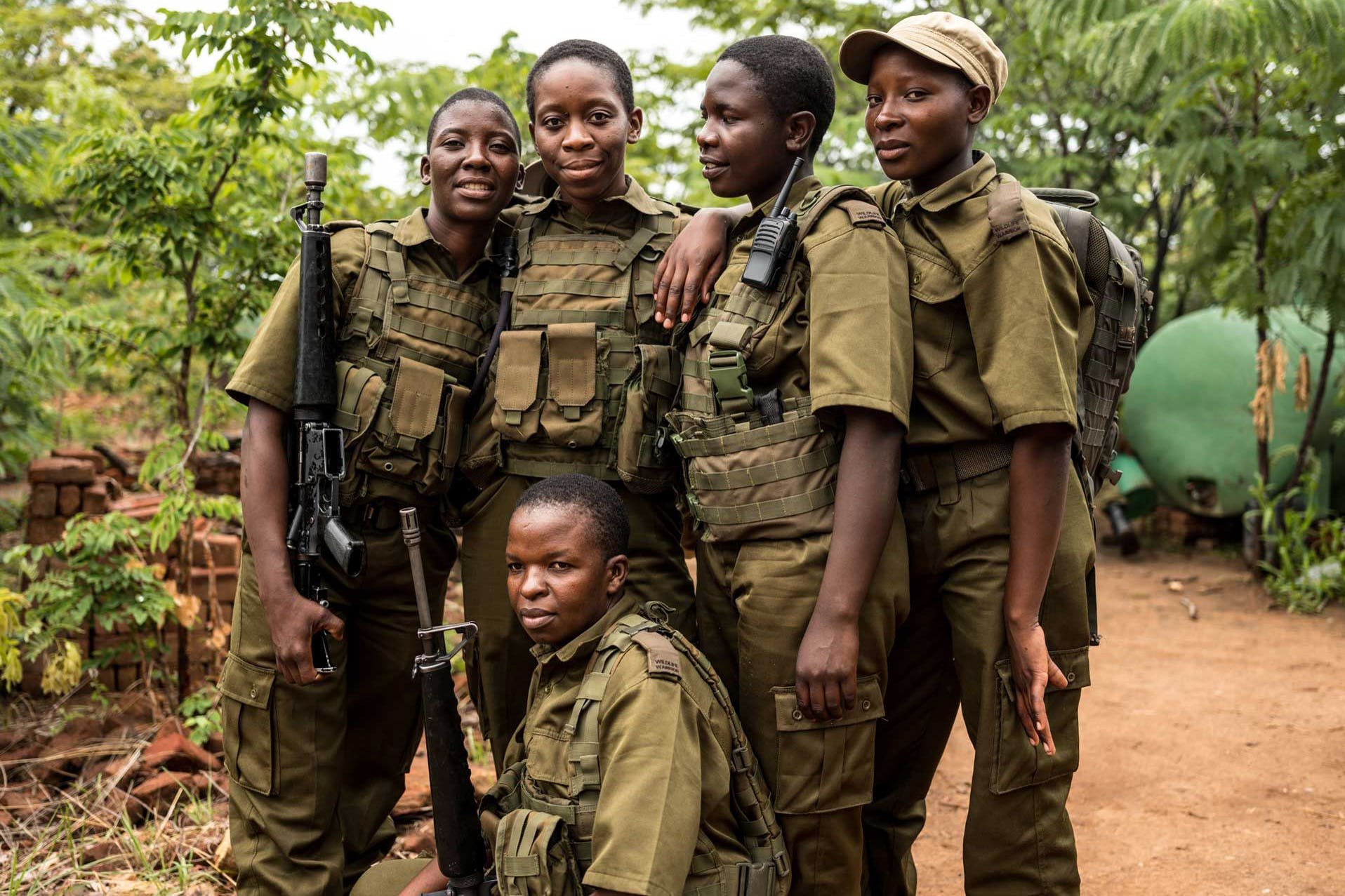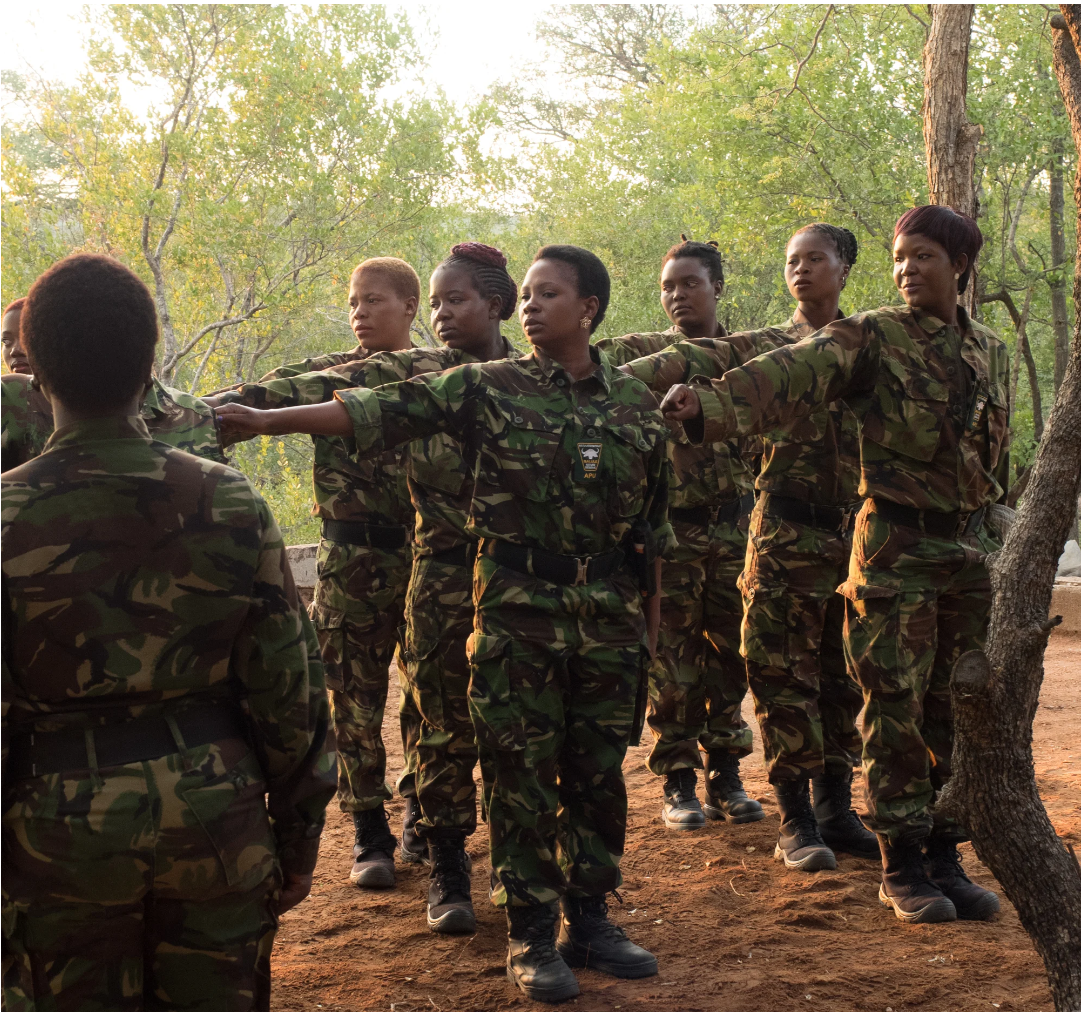Roaring Guardians
How women are shattering stereotypes and stomping their way forward for future generations of wildlife conservationists

An Akashinga ranger protects wildlife in Zimbabwe. Image credit: New Zimbabwe
The African savannah is home to many of Earth’s most critically endangered animals, like the Black Rhinoceros, African Elephant, and Mountain Gorilla. Poaching, habitat loss, and human encroachment are the main contributors to the rapidly approaching fall of these iconic giants.

A white rhinoceros, photographed by Kyle Smith, SafariSmiths Travel
In the challenging, often brutal world of wildlife conservation, the female guardians on the front lines are tying their hair back and marching defiantly onward.
A historically male-dominated industry, men in the conservation field often hold leadership positions and comprise the majority of field workers and researchers.
Are you surprised? Yeah, we weren’t either.
However, in recent years, there has been a significant shift towards greater gender diversity and inclusivity within the conservation industry. Women are increasingly taking on leadership roles, conducting scientific research, and leading conservation initiatives.

“For so long, we’ve been blinded by our egos from seeing the most powerful force in nature, and that’s a woman’s instinct to protect.”
— Damien Mander, CEO + founder, Akashinga
Women bring distinct perspectives to conservation efforts not only by stomping their boots on the ground, but also by tying in female-led educational programs that benefit local communities and empower the young people within them. Rooted in empathy and interconnectedness, these programs promote local engagement and educate their communities about sustainable conservation practices.
The indomitable women whose stories we’re telling below dedicate their lives to protecting and preserving these incredible animals with resilience, compassion, and unwavering spirit. Reading about them has us wanting to lace up our boots and hit the bush, or at least a heavy bag.

The Black Mambas on patrol. Photo credit: helpingrhinos.org/black-mambas
The Black Mambas
The Black Mambas are the world’s first all-female anti-poaching unit. Read that again, because OKAY LADIES. 🫡
Established in 2013, the unarmed group (!) operates in the Balule Nature Reserve, part of the Greater Kruger National Park in South Africa. Made up of 36 local women from nearby communities, the Black Mambas are dedicated to protecting wildlife, mainly elephants and rhinos, from poachers. Their laser-set focus is on the preservation of Black Rhinoceros, whose population is critically low. Rhinos are hunted for their horns, which are highly valued in traditional medicine and as status symbols. Kruger is home to the largest population of rhino in the world, and is also victim to more poaching attacks than any other area.
The Black Mambas’ approach emphasizes community engagement, education, and unarmed patrols. They inspect the perimeter fences, walking more than 20km daily, to disrupt poaching activities like wire snares set for trapping. A 63% reduction in poaching in their area of operation is a direct result from the Mambas’ work.
The women have received international recognition for their effective conservation efforts, and serves as a role model for empowering women in conservation and combating wildlife crime. You can learn more about The Black Mambas here.
*Source: helpingrhinos.org

A white rhinoceros, photographed by Kyle Smith, SafariSmiths Travel
Akashinga: The Brave Ones
The Akashinga (translated means "The Brave Ones”) is another incredible all-female anti-poaching ranger unit, this one operating in Zimbabwe.
Though the program was first founded in 2017 by the International Anti-Poaching Foundation (IAPF), the IAPF has officially become Akashinga. The Akashinga program recruits women from rural communities, including survivors of domestic abuse and single mothers, providing them with rigorous training in conservation and law enforcement. In this training, they find their power.
Led by a former Australian special forces soldier, the Akashinga rangers focus on protecting wildlife, particularly elephants and other endangered species, from poaching and illegal wildlife trade. The unit's approach emphasizes community engagement, gender equality, and sustainable conservation practices, earning recognition for its innovative and effective conservation efforts.
There’s a National Geographic documentary from executive producer James Cameron called “Akashinga: The Brave Ones” about this amazing group of heroines that we highly recommend. You can find it on ABC, Disney+, and National Geographic.
A celebration of the courageous and resilient women leading the charge for massive positive change in conservation, we promise this short documentary will give you goosebumps.
Dr. Jane Goodall

How could we talk about female conservationists without mentioning the G.O.A.T.?
Dr. Jane Goodall is a towering figure in the conservation movement. Her groundbreaking research on chimpanzees revolutionized our understanding of primates and their behavior, and her long-term study in Tanzania’s Gombe Stream National Park not only shed light on the complex social dynamics of chimpanzee communities but also highlighted the urgent need for wildlife conservation and habitat preservation.
Beyond her scientific contributions, Dr. Goodall's tireless advocacy efforts have inspired millions worldwide to take action for environmental protection and animal welfare. Through the Jane Goodall Institute, she has pioneered community-centered conservation initiatives, empowering local communities to become stewards of their natural resources.
Dr. Goodall's unwavering commitment to conservation, coupled with her compassionate approach to understanding and protecting animals, continues to resonate across generations, making her a revered icon in the field of wildlife conservation.
The transformative impact of empowering women in the field of conservation cannot be overstated. Prioritizing gender equality and youth empowerment leads to education, to breaking cycles of poverty and environmental harm. It contributes immeasurably to wildlife protection while empowering marginalized communities and promoting social justice.
Women in wildlife conservation leads to a more equitable and sustainable future, dedication to protecting our planet’s precious biodiversity, and to shaping a future where harmony between nature and humanity thrives.
Alexa! Play “Who Run The World” by Beyoncé.
To learn more about these incredible organizations, visit the links within.
To get up close and personal with them, book a trip with us. Want to help change the world?
